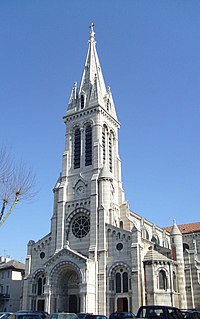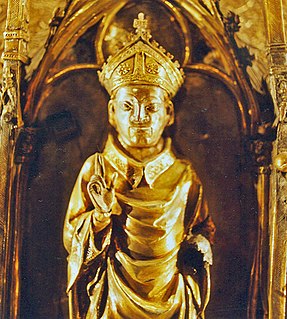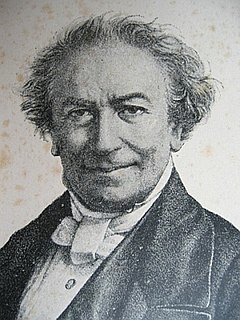Related Research Articles

Gap is a commune in southeastern France, the capital and largest town of the Hautes-Alpes department. At a height of 750 m above sea level, it is France's highest prefecture.

Écrins National Park is a French national park located in the south-eastern part of France in the Dauphiné Alps south of Grenoble and north of Gap, shared between the departments of Isère and Hautes-Alpes.

Jean-Baptiste Geneviève Marcellin Bory de Saint-Vincent was a French naturalist, officer and politician. He was born on July 6, 1778 in Agen (Lot-et-Garonne) and died on December 22, 1846 in Paris. Biologist and geographer, he was particularly interested in volcanology, systematics and botany. The standard author abbreviation Bory is used to indicate this person as the author when citing a botanical name.

April 19 - Eastern Orthodox liturgical calendar - April 21

Embrun is a commune in the Hautes-Alpes department in the Provence-Alpes-Côte d'Azur region in southeastern France.

The Ubaye Valley is an area in the Alpes de Haute-Provence département, in the French Alps, having approximately 7,700 residents. Its residents are called Ubayens. Its principal town is the sous-préfecture of Barcelonnette.

The Catholic Church in Madagascar is part of the worldwide Catholic Church, under the spiritual leadership of the Pope in Rome.

The Roman Catholic Diocese of Gap and Embrun is a suffragan diocese of the Latin Rite of the Roman Catholic Church in the ecclesiastical province of the Metropolitan Archdiocese of Marseille in Provence-Alpes-Côte d'Azur region, southern France.

The Roman Catholic Diocese of Digne is a diocese of the Latin Rite of the Roman Catholic Church in France. Erected in the 4th century as the Diocese of Digne, the diocese has been known as the Diocese of Digne (–Riez–Sisteron) since 1922. The diocese comprises the entire department of Alpes-de-Haute-Provence, in the Region of Provence-Alpes-Côte d'Azur. The diocese used to be a suffragan of the Archdiocese of Aix-en-Provence and Arles until 2002, but is now a suffragan of Marseille. The bishops have their throne in Digne Cathedral at Digne-les-Bains.

The Roman Catholic Archdiocese of Aix-en-Provence and Arles is an archdiocese of the Latin Rite of the Roman Catholic Church in France. The Archepiscopal see is located in the city of Aix-en-Provence. The diocese comprises the department of Bouches-du-Rhône, in the Region of Provence-Alpes-Côte d'Azur. It is currently a suffragan of the Archdiocese of Marseilles and consequently the archbishop no longer wears the pallium.

The Roman Catholic Diocese of Saint-Flour is a Diocese of the Latin Rite of the Roman Catholic Church in France. The diocese comprises the department of Cantal. Erected in 1317, the diocese was suffragan of the Archdiocese of Bourges until 2002. With the general reorganization of the structure of the French church by Pope John Paul II, Saint-Flour became the suffragan of the Archdiocese of Clermont. The seat of the bishop is located in Saint-Flour, Cantal.
Palladius may refer to:

The former French diocese of Sisteron existed until the French Revolution. Its see was at Sisteron in southern France and at Forcalquier, in the modern department of Alpes-de-Haute-Provence. Sisteron was the only diocese in France which had two cathedrals. Each cathedral had a Chapter, and the two Chapters voted together when an election was held to elect a new bishop of Sisteron. The diocese of Sisteron was part of the ecclesiastical province of Narbonensis Secunda, whose Metropolitan was the Archbishop of Aix-en-Provence.

The Roman Catholic Archdiocese of Embrun was located in southeastern France, in the mountains of the Maritime Alps, on a route that led from Gap by way of Briançon to Turin. It had as suffragans the Diocese of Digne, Diocese of Antibes and Grasse, Diocese of Vence, Diocese of Glandèves, Diocese of Senez and Diocese of Nice. Its see was the Cathedral of Nôtre Dame in Embrun.
Waldalenus or Wandalenus, dux in the region between the Alps and the Jura, in the Frankish Kingdom of Burgundy, was a Frankish magnate who served as mayor of the Austrasian palace at Metz from 581, during the minority of Childebert II.

Saint Palladius of Embrun was a 6th-century bishop of Embrun. Born to a Christian family, he studied under Catulin, bishop of Embrun, who had attended the Council of Épaone in 517. When the Arians and Sigismund of Burgundy opposed the council, Catulin was exiled to Vienne. Palladius accompanied him there, and took the opportunity to extensively study Scripture. Palladius was ordained a priest and, according to legend, gained the gift of prophecy. He is said to have predicted the fall and death of Sigismund. Catulin died around 518, and Palladius would later be elected bishop of Embrun. During his episcopate he built numerous churches, in Chorges, Sauze, and Rama, as well as sanctuaries dedicated to Saint Martin of Tours, and Saints Vincent, Orontius, and Victor, as well as to Genesius of Arles. One source states that Palladius "possessed an exceptional efficacy in obtaining whatever he petitioned God for." Many miracles were attributed to him, and, besides the gift of prophecy, he enjoyed a "mystical familiarity with the angels... [and] successfully defeated the machinations of the devil simply by making the sign of the cross."

Saint Domnin was the first Bishop of Digne, from 364 to 379. He was also the Archbishop of the city of Vienne, Isère.

Saint Vincent was the second Bishop of Digne, from 380 to 394.

Jean-Baptiste-Ambroise-Marcellin Jobard was a Belgian lithographer, photographer and inventor of French origin. Founder of the first significant Belgian lithographic establishment, first photographer in Belgium on 16 September 1839, director of the Musée de l’Industrie de Bruxelles from 1841 to 1861, Jobard played a role, in the artistic, technological, scientific and industrial development of Belgium during the Dutch period and the reign of Leopold I.
Bernardin François Fouquet was a French Catholic prelate, Cardinal, abbot and archbishop of Embrun from 1740 to 1767.
References
- ↑ Saint Marcellin d'Embrun.
- ↑ Vincent J. O'Malley (2001). Saints of Africa. Our Sunday Visitor Publishing. p. 58. ISBN 978-0-87973-373-5.
- ↑ Jacques Humbert (1972). Embrun et l'Embrunais à travers l'histoire. Société d'études des Hautes-Alpes. p. 49.
| Catholic Church titles | ||
|---|---|---|
| Preceded by NA | Bishop of Embrun 354–c.374 | Succeeded by Artemius |